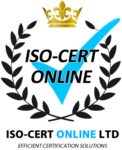No products in the basket.
Curriculum
- 10 Sections
- 76 Lessons
- Lifetime
Expand all sectionsCollapse all sections
- Introduction2
- Module 1 - Introduction to QMS19
- 3.11.1 What is ISO? (QMS)
- 3.21.2 ISO Standards (QMS)
- 3.31.3 What is ISO 9001? (QMS)
- 3.41.4 ISO 9001 Derivatives (QMS)
- 3.51.5a ISO 9001 Structure (QMS)
- 3.61.5b ISO 9001 Structure – Part 2 (QMS)
- 3.71.6 What is a Quality Management System? (QMS)
- 3.81.7 What is an Integrated Management System? (QMS)
- 3.91.8 The Process Approach (QMS)
- 3.111.10 QMS Principles in ISO 9001 (QMS)
- 3.121.11 Quality Management (QMS)
- 3.131.12 What is Quality? (QMS)
- 3.141.13 Customer Expectation (QMS)
- 3.151.14 The 5 Causes of Poor Quality (QMS)
- 3.161.15 The Cost of Poor Quality (QMS)
- 3.171.16 Documenting the Quality Management System (QMS)
- 3.181.17 Implementing the Quality Management System (QMS)
- 3.191.18 Benefits of a Quality Management System (QMS)
- 3.20Module 1 Test (QMS)5 Questions
- Module 2 - The Planning Phase15
- 4.12.1 Introduction (QMS)
- 4.22.2 Understanding the Context (QMS)
- 4.32.3 Interested Parties (QMS)
- 4.42.4 Determining Scope (QMS)
- 4.52.5 Leadership and Commitment (QMS)
- 4.62.6 Quality Policy (QMS)
- 4.72.7 Roles and Responsibilities (QMS)
- 4.82.8 Addressing Risks and Opportunities (QMS)
- 4.92.9 Objectives and Targets (QMS)
- 4.102.10 Resources (QMS)
- 4.112.11 Competence (QMS)
- 4.122.12 Awareness (QMS)
- 4.132.13 Communication (QMS)
- 4.142.14 Documented Information (QMS)
- 4.15Module 2 Test (QMS)5 Questions
- Module 3 - The Operation Phase9
- 5.13.1 Operational Planning & Control (QMS)
- 5.33.3 Products & Services – Requirements
- 5.43.4 Design & Development
- 5.53.5 Externally Provided Resources
- 5.63.6 Production / Service Provision
- 5.73.7 Post-Production Activities
- 5.83.8 Control of Non-Conformance
- 5.93.9 Operating the QMS
- 5.10Module 3 Test (QMS)5 Questions
- Module 4 - The Check and Act Phases7
- Module 5 - The Internal Audit11
- 7.15.1 Principles of Internal Auditing
- 7.25.2 Internal Auditor Responsibilities
- 7.35.3 Internal vs. External Audit
- 7.45.4 Purpose of Internal Audit
- 7.55.5 Requirements of ISO
- 7.65.6 Criteria for Selecting Internal Auditor
- 7.75.7 Internal Audit Findings
- 7.85.8 Audit Non-Conformities
- 7.95.9 Audit Observations
- 7.105.10 Major & Minor Non-Conformities
- 7.11Module 5 Test (QMS)5 Questions
- Module 6 - Organising the Internal Audit5
- Module 7 - Internal Audit Elements8
- Module 8 - The Main Audit7
- Follow-On Courses1



